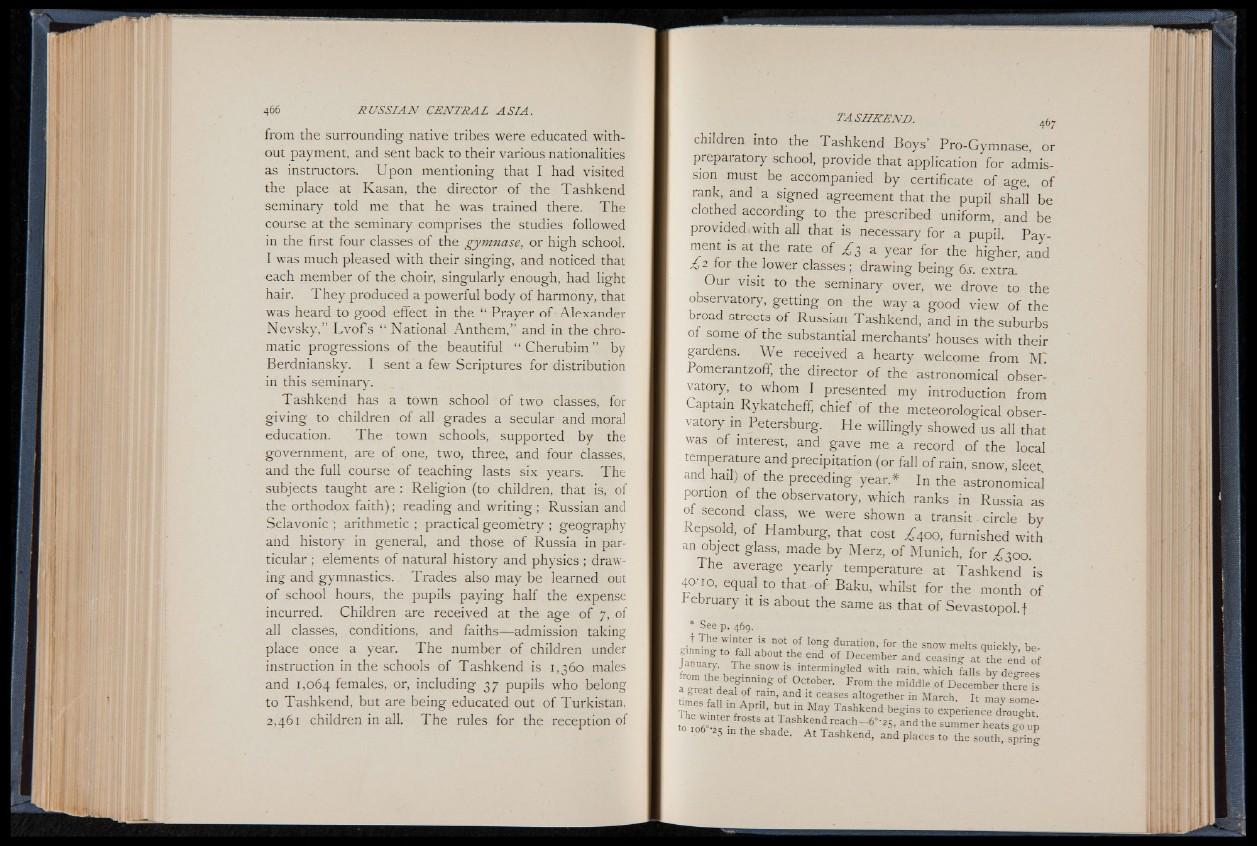
from the surrounding native tribes were educated without
payment, and sent back to their various nationalities
as instructors. Upon mentioning that I had visited
the place at Kasan, the director of the Tashkend
seminary told me that he was trained there. The
course at the seminary comprises the studies followed
in the first four classes of the gymnase, or high school.
I was much pleased with their singing, and noticed that
each member of the choir, singularly enough, had light
hair. They produced a powerful body of harmony, that
was heard to good effect in the “ Prayer of -Alexander
Nevsky,” L vo fs “ National Anthem,” and in the chromatic
progressions of the beautiful “ Cherubim ” by
Berdniansky. I sent a few Scriptures for distribution
in this seminary.
Tashkend has a town school of two classes, for
giving to children of all grades a secular and moral
education. The town schools, supported by the
government, are of one, two, three, and four classes,
and the full course of teaching lasts six years. The
subjects taught are : Religion (to children, that is, of
the orthodox faith); reading and writing; Russian and
Sclavonic arithmetic ; practical geometry ; geography
and history in general, and those of Russia in particular
; elements of natural history and physics ; drawing
and gymnastics. Trades also may be learned out
of school hours, the pupils paying half the expense
incurred. Children are received at the age of 7, of
all classes, conditions, and faiths— admission taking
place once a year. The number of children under
instruction in the schools of Tashkend is 1,360 males
and 1,064 females, or, including 37 pupils who belong
to Tashkend, but are being educated out of Turkistan,
2,461 children in all. The rules for the reception of
children into the Tashkend Boys’ Pro-Gymnase, or
preparatory school, provide that application for admission
must be accompanied by certificate of age, of
rank, and a signed agreement that the pupil shall be
clothed according to the prescribed uniform, and be
provided 1 with all that is necessary for a pupil. Payment
is at the rate of ^3 a year for the higher, and
£2 for the lower classes; drawing being 6s. extra
Our visit to the seminary over, we drove to the
observatory, getting on the way a good view of the
broad streets of Russian Tashkend, and in the suburbs
of some of the substantial merchants’ houses with their
gardens. We received a hearty welcome from M'
Pomerantzoff, the director of the astronomical observatory,
to whom I presented my introduction from
aptain Rykatcheff, chief of the meteorological observatory
in Petersburg. He willingly showed us all that
was of interest, and gave me a record of the local
temperature and precipitation (or fall of rain, snow, sleet
and hail) of the preceding year.* In the astronomical
portion o f the observatory, which ranks in Russia as
of second class, we were shown a transit circle by
Repsold, o f Hamburg, that cost ¿400, furnished with
an object glass, made by Merz, of Munich, for ¿300.
The average yearly temperature at Tashkend is
40-10, equal to that o f Baku, whilst for the month of
nary it is about the same as that of Sevastopol.!
* See p. 469.
J ? * 1 n0t 0f long duration- for the snow melts quickly befanuaw
Tl- the end of December and ceasing at the end of
fmm ^ A n0W1,S lnterminUed with rain, which falls by degrees
a great^ P 0ctober- From the middle .of December there is
ti.iT t n a fam’ and A Ceases t o g e t h e r in March. It may some-
The I mf„ P ’ b-P in May Tashkend begins to experience drought
T f J aShk/ nm reaCh- 6°-2S> aad ^ summer heats gS>p
5 h.e shade. A t Tashkend, and places to the south, spring